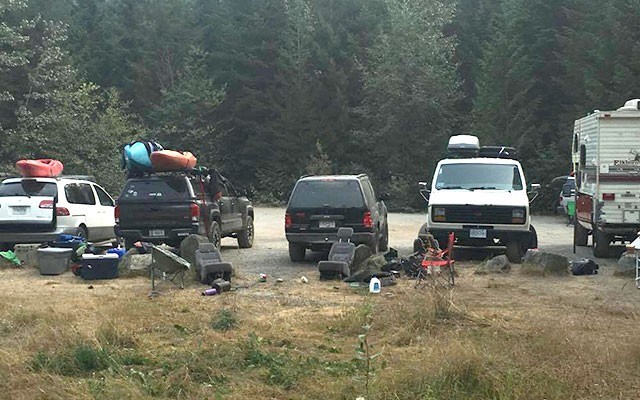A Cheakamus Crossing resident is speaking out against the mess left behind by illegal campers before her neighbourhood becomes "a public bathroom."
Every day Karen Thomson walks her dogs through the former Athlete's Village, and every day she sees the same thing: groggy campers sleeping in vans, piles of discarded trash, and sometimes, even, human waste. "I walk my dogs through the House Rock parking lot every morning and I see the same crew," she said.
"These people aren't from here, they don't think about it, and they dump their food, they dump their garbage, they use the bathroom. This one guy literally had a roll of toilet paper in his hand. I can see you! Last year I saw a guy pooping. I couldn't even believe I saw somebody defecating."
It's an issue that hasn't gone unnoticed by residents either. The Cheakamus Crossing Facebook page is littered with comments decrying what appears to be a spike in illegal camping. One resident Pique spoke with, who declined to go on the record, claimed he counted 16 campers one recent morning. The Resort Municipality of Whistler (RMOW) has so far this year received nine complaints of illegal camping in the Cheakamus area. The campers appear to be concentrated to a small area between the House Rock parking lot and a nearby Forest Service Road. Thomson said she regularly makes reports to bylaw, sending along photos of trash and license plate numbers, but that, typically, by the time officers arrive, the campers have dispersed.
She suggests bylaw officers make regular patrols of known camping areas, something Mayor Nancy Wilhelm-Morden said is certainly possible, although the threat of wildfire has been authorities' main priority in recent weeks. "We haven't taken that kind of aggressively proactive stance with illegal camping, but that's not to say we don't do it in the future," she noted. "Right now we've got our hands full with the fire-hazard issue."
Beefing up educational efforts would also go a long way towards curbing the problem, believes Thomson, who wants to see more signage in the area that points campers to nearby washroom and garbage facilities.
"We need some education because I'm sure if people knew they could drive a minute and a half to find a bathroom with a door and a seat, and soap, they'd appreciate that," she said. "These aren't horrible people, it's just so gross because our neighbourhood is becoming a public bathroom and I find that really disturbing."
But Wilhelm-Morden is reluctant to erect signs with directions to the nearest amenities because they would "tacitly condone" illegal camping.
"The signage that needs to go up, if we do need more signs are: 'You are prohibited from camping here. Here are the locations of campsites where camping is allowed,'" she said.
Of course, the rise in camping can be directly linked to Whistler's ongoing affordability issues and housing shortage, something Wilhelm-Morden said the RMOW is "working diligently" on through a task force and a number of housing projects in the works or nearing completion.
"In the meantime though, we just can't be allowing camping where it's not permitted," said Wilhelm-Morden.
"The primary concern is wildlife attractants. The residents who have complained have complained about the mess these campers have left behind, and that is the issue."




